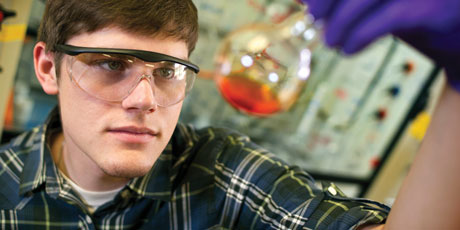Old-Timers
Coral Reef Resiliency
UT Arlington biologists look to the past to predict the future of coral reef survival

Associate Professor Laura Mydlarz in front of corals
With age comes wisdom, the old saying goes. For coral reefs vital to ocean diversity and health, age may also bring resiliency.
UT Arlington biologists Laura Mydlarz and Jorge Pinzón published research in 2014 showing that older coral species are better able to survive various diseases. Their findings are especially important because stressors like pollution, overfishing, and climate change have weakened coral defenses and made some species more susceptible to white plague and other diseases.
Working with colleagues at the University of Puerto Rico-Mayaguëz, Drs. Mydlarz and Pinzón examined 140 samples of 14 species of Caribbean coral, some of which have been around for 200 million years. They narrowed in on two factors—inhibition of bacterial growth and melanin concentration—that are higher in older coral and likely play an important role in disease resistance.
The research gives scientists a starting point to determine which species may be more susceptible to disease. It could also help predict what the oceans of the future will look like.
“We don’t think coral reefs will go away,” Mydlarz says, “but they will change and that change could affect everything else that depends on the reef ecosystem.”

















